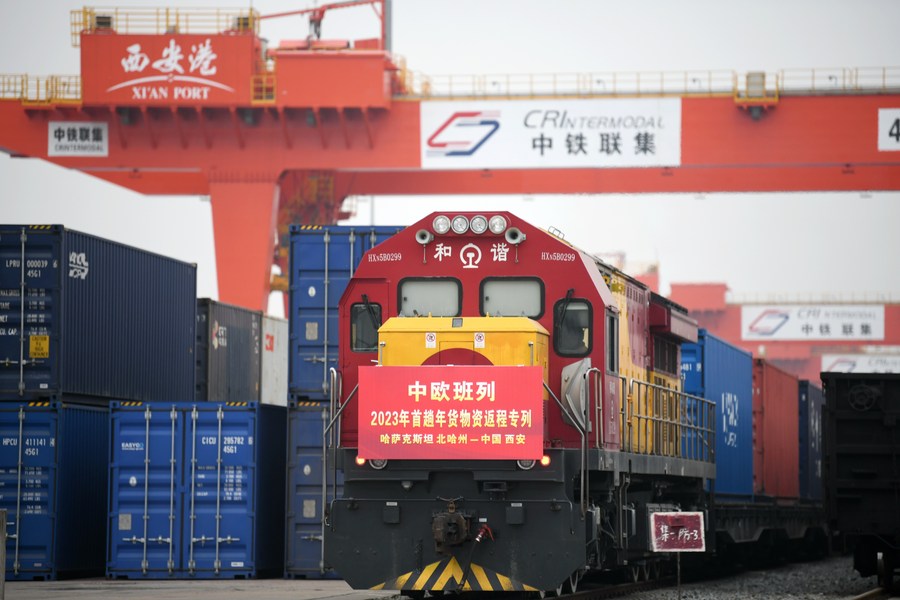Continuous opening-up key to China's new GDP target, says senior economist
- ?By Xu Xiaoxuan
 0 Comment(s)
0 Comment(s) Print
Print E-mail China.org.cn, March 10, 2023
E-mail China.org.cn, March 10, 2023

A China-Europe freight train loaded with 1,300 tonnes of flour from Kazakhstan arrives at Xi'an International Port in Xi'an, northwest China's Shaanxi Province, Jan. 13, 2023. [Photo/Xinhua]
To achieve the economic growth target set for this year, China needs to maintain its reform and opening-up policies while investing more in rural areas and small cities, according to David Blair, vice-president and senior economist at the Center for China and Globalization (CCG), in an interview with China.org.cn.
China aims to achieve GDP growth of around 5% in 2023, one of the key objectives in the Government Work Report delivered at the first session of the 14th National People's Congress on March 5.
"China is now a much richer economy, and it's hard [for it] to grow as fast as 9% or 10%. So, I think 5% is probably a reasonable growth rate," said Blair, adding that China will see catch-up growth this year from missed opportunities caused by the COVID-19 pandemic.
Blair emphasized that "the key to achieving the 5% of growth is continuing with the reform and opening-up process," which aligns with the Government Work Report's emphasis on deepening reform and opening-up in all respects and expanding market access to provide greater business opportunities for foreign companies in China.
Blair also stressed investing more in rural areas and small cities, especially their business environments, highlighting their potential to generate a huge amount of new wealth.
In recent years, China has noticeably increased average incomes in rural areas and improved working and living conditions, thereby eliminating poverty, upgrading infrastructure, and boosting education resources.
Blair said that China has the strength to achieve this year's GDP target, partly thanks to its huge consumption demand.
"As Chinese consumers have gotten richer and are able to purchase a lot more, they're creating demand not only for Chinese producers but also for worldwide producers."
Before the pandemic, consumption had become the primary driver of China's economic growth. This year, priority will be given to the recovery and expansion of consumption, and efforts will be made to stabilize spending on big-ticket items and promote recovery of consumption in consumer services, according to the report.
Another key strength is China's improved infrastructure system, not just in populated coastal areas but throughout the country, which enables the establishment of various businesses, noted Blair. In 2022, China's investments in infrastructure rose by 9.4%.
While giving weight to economic growth, the Chinese government also pursues a greener and more efficient economy. High-quality development was once again highlighted in the report.
Blair pointed out that China needs to move up the value chain and produce higher value-added products to increase productivity and unlock the economy's potential.
Blair emphasized China's significant role as a major demand source, both domestically and internationally, with trading volumes between China and other countries, especially the Belt and Road partner countries, growing at an impressive rate. He added that smooth business exchanges with China are of critical significance.





